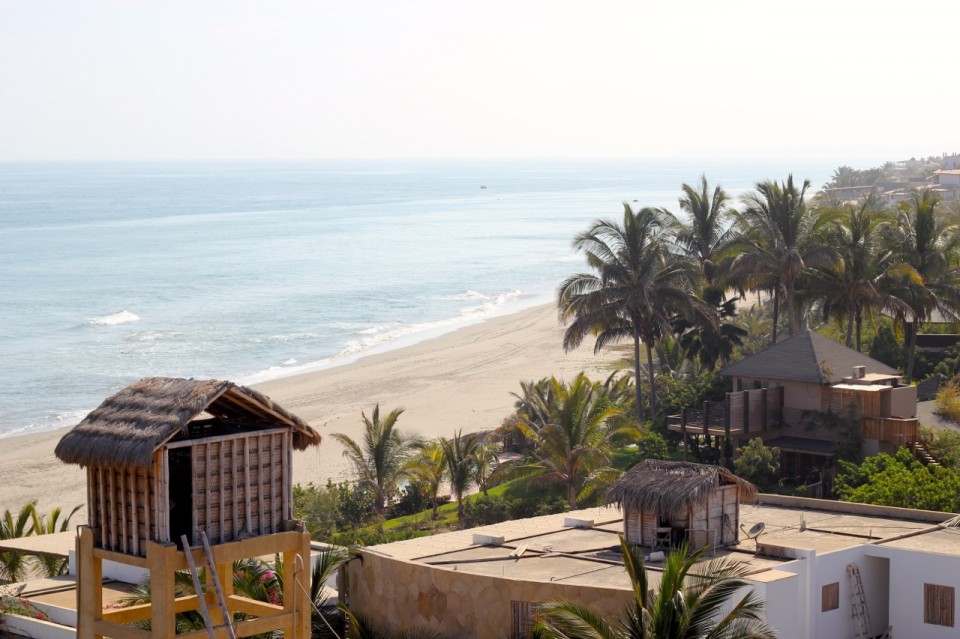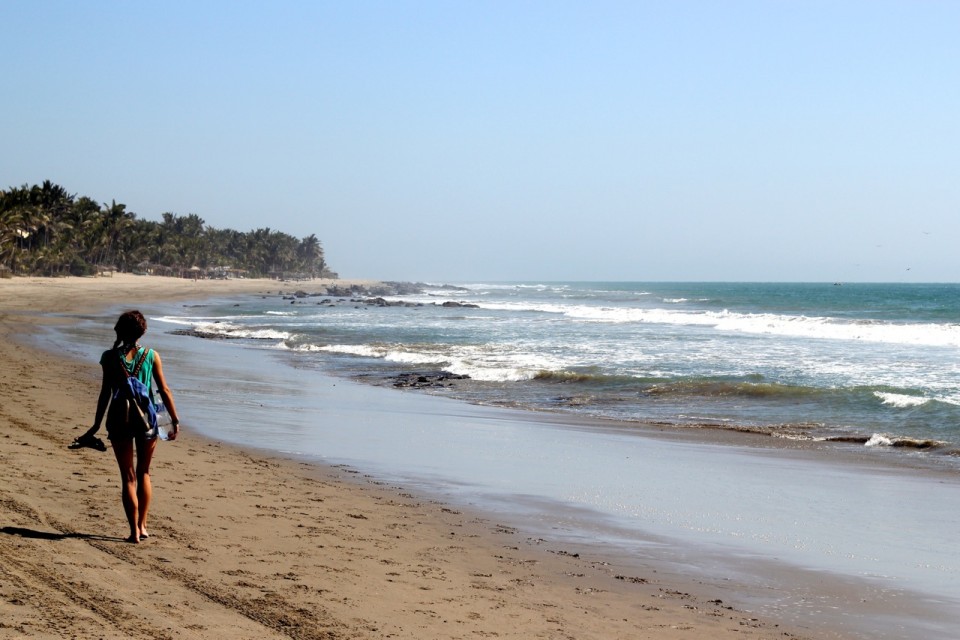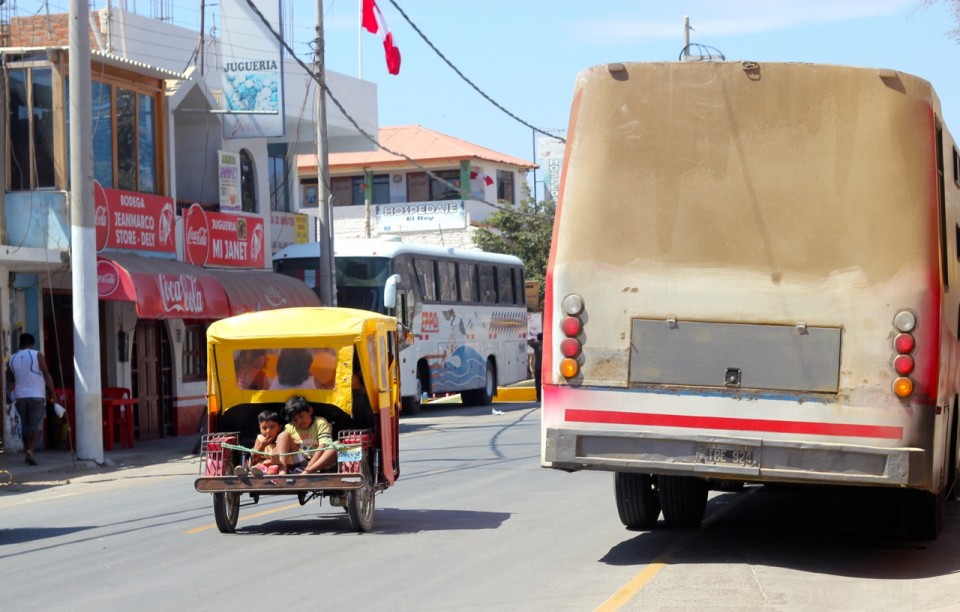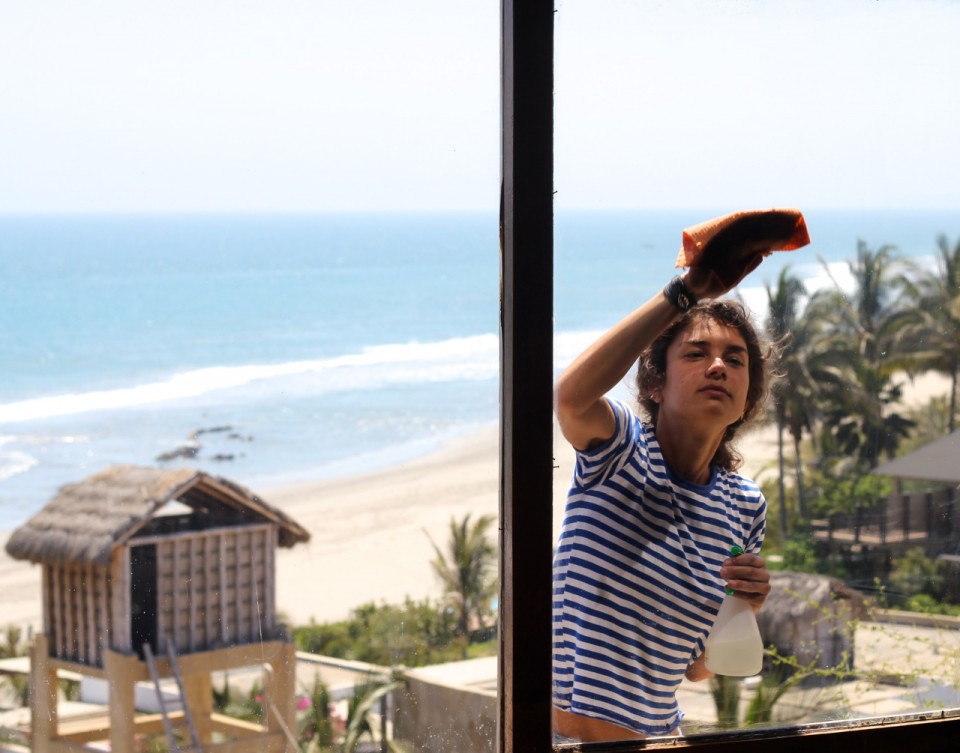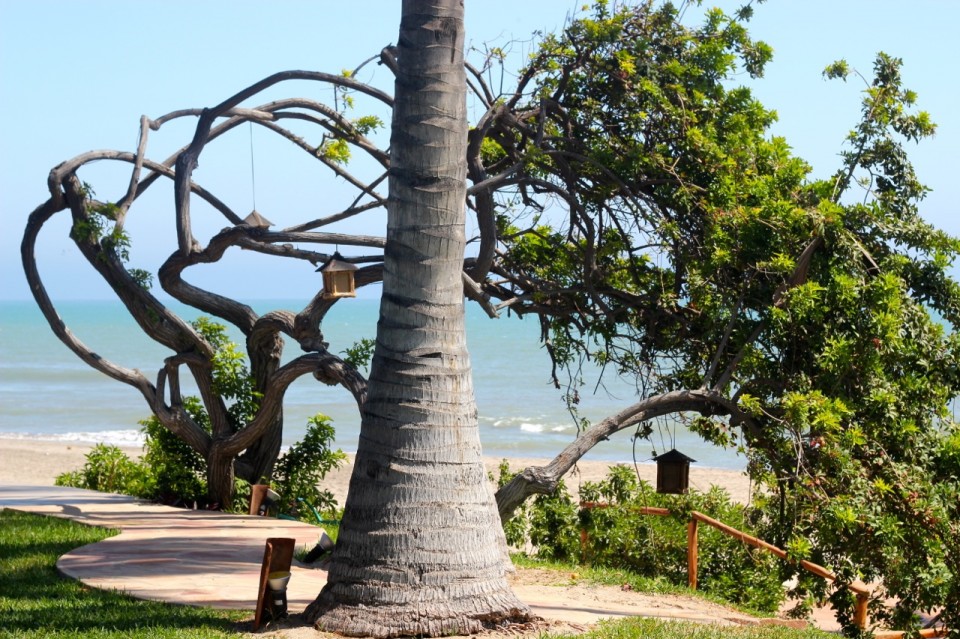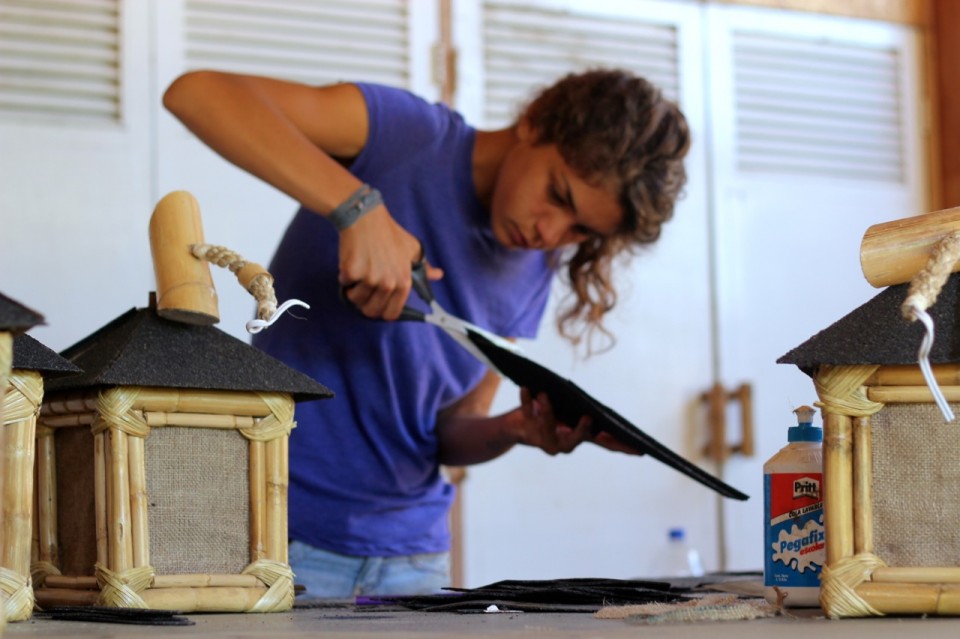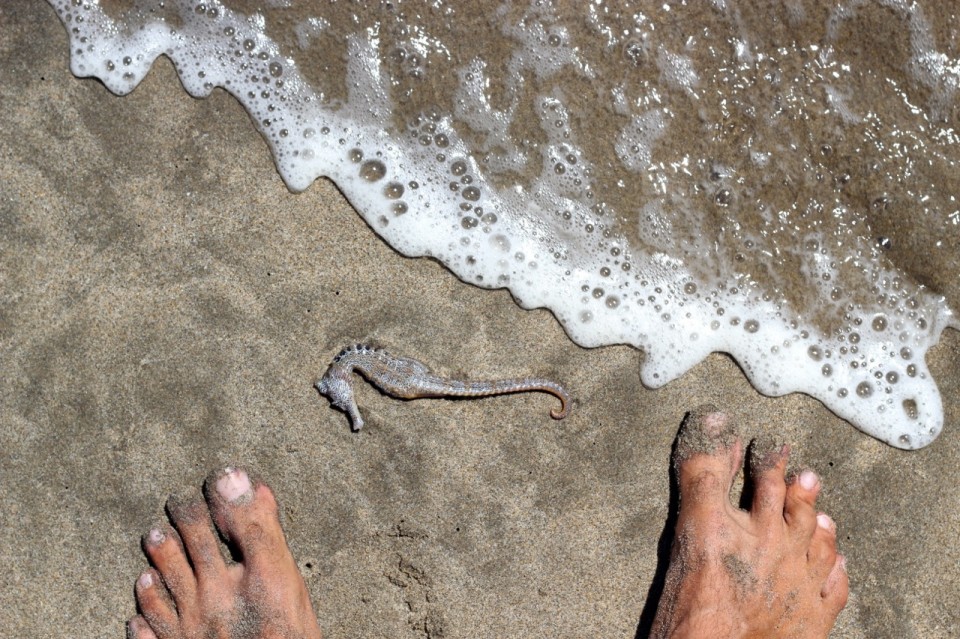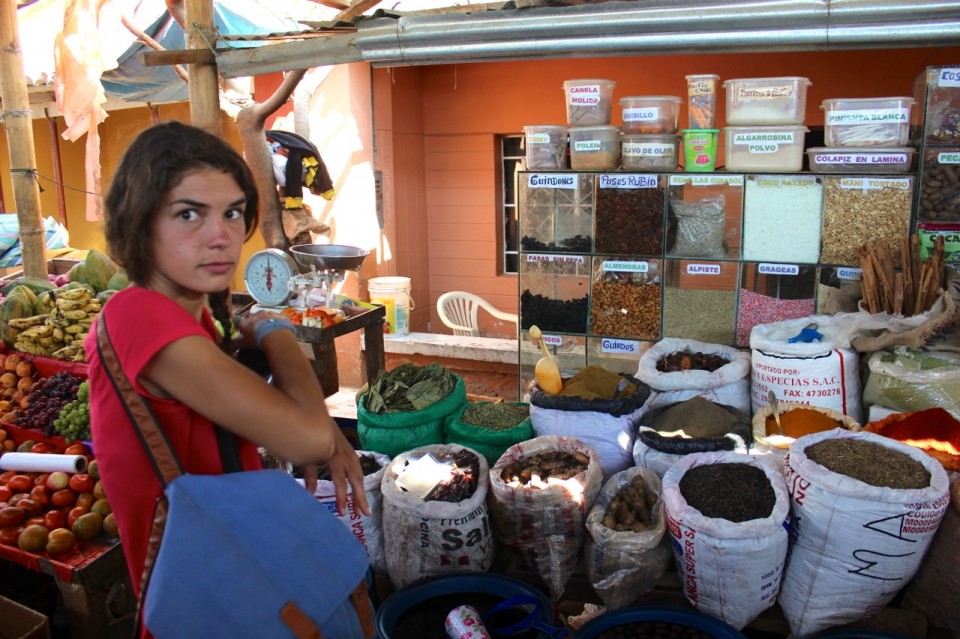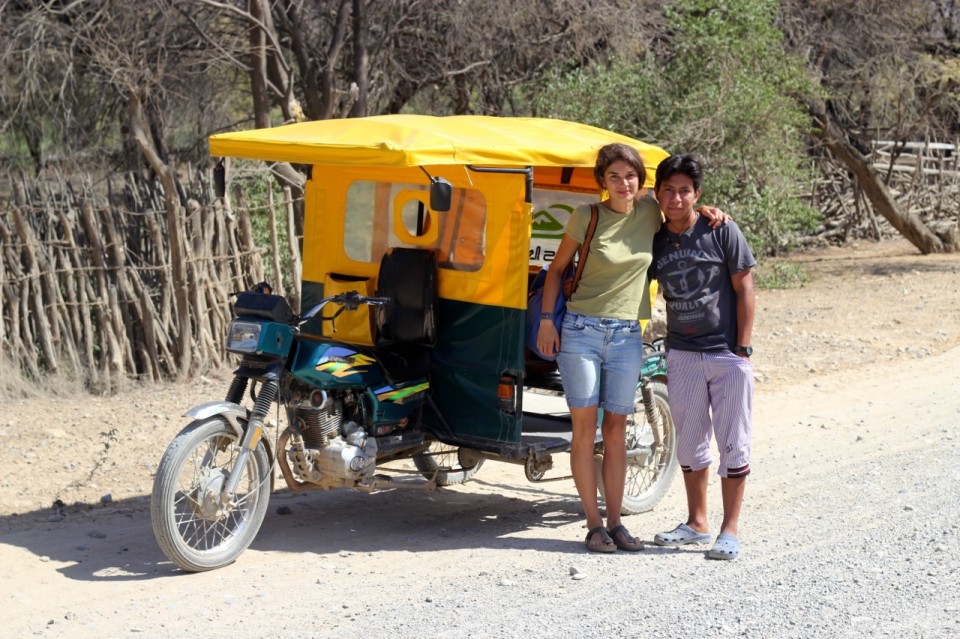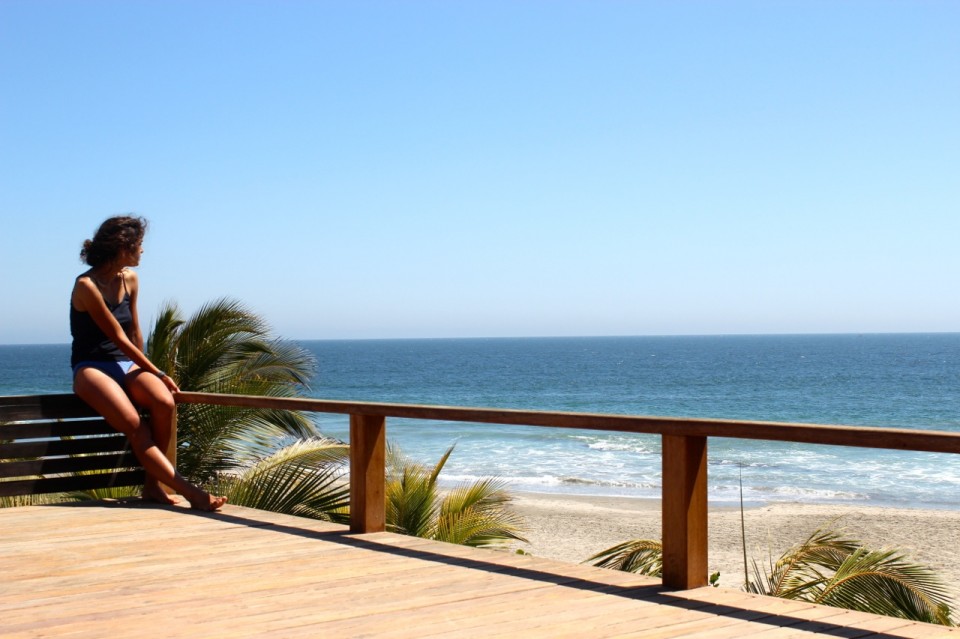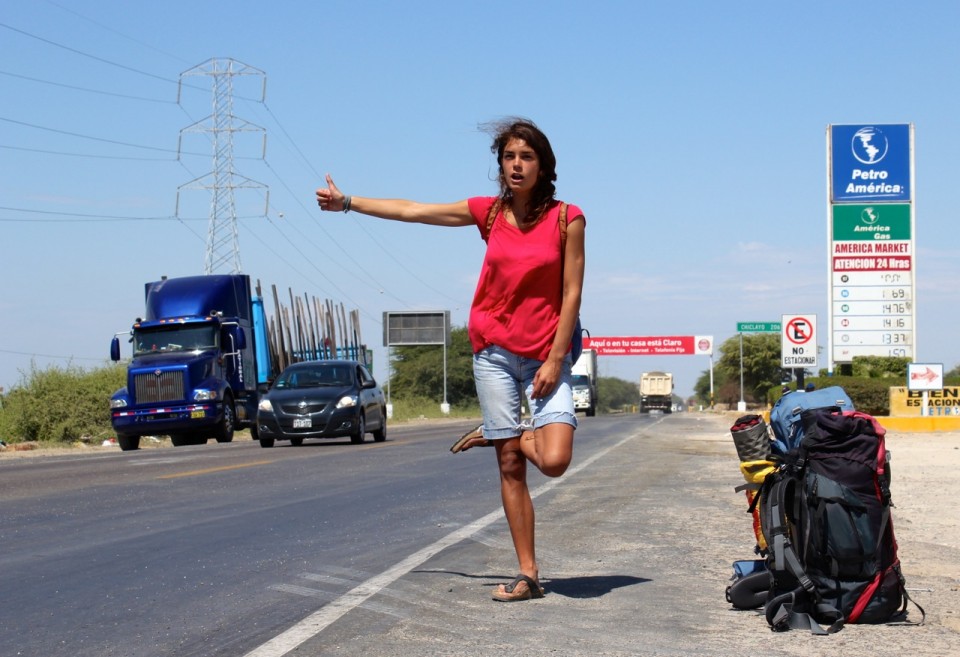While travelling you very often find yourself in a new place in the middle of the night and it’s difficult to tell what the city looks like, at least until you wake up the following morning and take a look out of the window. Sometimes, but only sometimes, the sight you see leaves you speechless. The very same thing happened to us the following morning in Mancora.
We knew we didn’t go wrong when we chose this place for volunteering for a couple of weeks.
Even though we got there in the middle of the week, Cristina, the owner of the hotel, decided to spare us a bit for the first day: she practically made us take a walk, see the beach, study the hotel a bit, feel the energy of the place, get to know the people… to make ourselves feel at home. That was exactly what we did!
We made ourselves a fruit juice for breakfast using the fruit Linas, our chef, got for us the very same morning at the market; after that we took only the basics and went to the beach. It was then that we realized why our new friend (who at first lent us, and a few days later even sold to us his camera – we did the transaction with a few clicks on Internet with the help of my MasterCard – thank you, sponsors!), went for a swim only two times since he’d been there, that is, a bit more than two months. Although the temperature during the whole year was the summer one, the temperature of the sea was not. During this part of the year its temperature is constantly below 20°C which wouldn’t be such a problem if there wasn’t for one thing – big waves. Being spoilt by the warmth and the calmness of the Adriatic sea we simply got our feet wet, chattered with our teeth and followed the beach to the city that was an hour and a half away.
The city that was, in fact, with its nine thousand inhabitants – a village. It was situated, like the rest of the coastal area of Peru, in the middle of the desert. That contrast was the first thing you notice: on one hand, there was the immense blue, and, on the other hand, you could see the endless abundance of brown sand. That is the exact place were Mancora was built, the second most visited destination in Peru, just behind the world known Cusco, the last stop on your way to Machu Picchu.
There are several aspects of Mancora: it is the place where young gringos hang out and who come there for the sun, beach and surfing; and a few additional things which are easily accessible: only thing you need to do is exchange a couple of sentences with the local boys who, with a smile on their face, ask you well practiced questions – Do you speak Spanish? Where are you from? Do you surf?
Do you smoke weed?
Another aspect of Mancora is a classier one, which could be seen by the people living outside the center, in the part leading to our hotel. On the beach area of approximately 5 kilometers there was a great number of hotels, apartments, huts with one thing in common – the price that was a bit high. Families with pale skin, men with golden chains around their necks, women with large sunglasses, bottles of champagne next to sun beds on the beach.
And the two of us, in the very middle between the two extremes, taking a bit from both groups; young gringos situated in the area for the rich ones. The paradox was the most evident when we started bargaining with the rickshaw driver: he couldn’t possibly understand that someone was going to Las Positas, the luxury area and that the same person was bargaining for every soles. However, when we explained to him that we weren’t staying at the expensive hotel, but that we were working, that is, volunteering, he lowered the price from ten to eight soles. During the following few days we’d fix the price at 5.
The following day we finally started working. That was the deal before coming here: we were supposed to work five hours a day, five days a week in exchange for food and accommodation. Since we were situated in the house for the volunteers and since we were the first volunteers to come, there were quite few things to do around the house: the rooms needed some repainting, the windows needed some cleaning, the floors needed to be swept every day due to the sand drifts and bunch of remains of smaller house work. With all those things, whenever we had an idea we would write it down and in that way we would collect the ideas of how should the house for the volunteers look in the future.
If someone had told me a month ago that soon I would be in Peru, I would’ve told them that they were crazy – Mare told me while cleaning the windows. But if someone had told me that soon I would be in Peru, cleaning windows and sweeping the floors I would say that, in that case, I’d be the crazy one.
The great thing was that the both of us accepted openheartedly those crazy little things. To come at the end of the world in the middle of long-awaited Croatian summer, be robbed in a park, hitchhike on the longest road in the world, got food poisoning and, in the end, clean a house in exchange for food and accommodation – it doesn’t seem like the most ideal choice. However, it was. The secret was in – our choice. Our. Choice. The choice with which we’re free to do whatever we want to. In that sense, not even scrubbing floors seems difficult since we know that we’re free. Stay or leave; whatever we feel like doing.
After a few days spent working on the house for the volunteers, we started helping around the hotel which was supposed to open in two weeks’ time. KiChich is, in fact, extraordinary hotel, full of unique details. The hard work, love and ideas invested in it were evident. It was imagined as a fusion of glamour (a night spent there costs a couple of hundreds of dollars!) and natural simplicity: almost all the materials within and around the hotel were made either of wood or rock.
That was where our work became much more interesting. Instead of plain old cleaning we got the assignment to be creative. We made these small house-lamps, painted some details on the walls using strange combinations of colours; we made a fence for the outdoor shower out of wooden branches, helped out in the kitchen. The kitchen was one of the most important parts of the hotel: Cristina, who is a vegetarian and all for the raw food, based the entire hotel on that philosophy. The Health. The connection to the nature. The connection to one’s self.
The time was passing by very quickly. We were really enjoying ourselves.
Also, we talked about how it was an excellent idea to combine some work with the travelling. Maybe not when you take a two-week vacation to relax your body and mind from all the work, but when your life comes down to constant travelling – the work is indispensable. Honestly, a journey may become a bit boring. You may be overwhelmed by the feeling of not seeing the point just like it can happen when you exaggerate with anything else. So, it feels good to be useful from time to time; to be concrete; to see the results of one’s work.
Work is a beautiful thing. But with two conditions.
The first one: you have to enjoy in what you’re doing. You have to love it. A smart man once said: Pick a job you love and for the rest of your life you won’t have to work anymore. Or something like that. The second condition: you have to be free in what you’re doing. You have to have to liberty to stay or leave, whatever makes you happier.
The sad thing is that today’s jobs, or work in general, has assumed a negative aspect. It’s seen as an inevitable evil. After all, it is logical – in the world of mortgages, television and colourful ads on every corner; in the world where all the values have been turned upside down; in the world of unnecessary and exaggerated consumption of everything – one gets accustomed easily. One gets accustomed easily to the idea that you simply need to work and make some money in order to be able to afford stuff that will make your life a bit prettier, or, at least, more endurable. Also, there’s always the opinion of the others. What will others say? Just fit in; don’t get out of the rut.
The point isn’t working your ass off doing something you don’t like just to make as much money as possible to enjoy life, but the point is to use the money you have (or don’t have) to create the best life possible and spend your time doing something you truly love – a friend of mine said to me a while back in the foot of Himalaya. And he was right.
But many have already written articles, books, texts, and blogs about it. And everyone knows everything about it. Or at least they can know everything if they want to.
Our work days soon assumed a certain aspect of a routine: after waking up we had a breakfast consisting of fresh fruit followed by a few-hours work in the hotel. The local craftsmen, who had been working and building in and around the hotel, became our friends. Even though at first they were surprised to see the gringos working with them soon we were listening to Peruvian music together out of an old cassette player, making jokes using my shattered Spanish, calling each other “Maestro!” when we would pass by each other and so on. Family/working atmosphere.
Around noon we would usually take a break and take a half-hour walk long the beach until we found the first place to take a coffee. Also, there we had an opportunity to change our environment a bit, write, relax, read, or simply do nothing. Okay, the staff did need two weeks to learn to prepare coffee in less than thirty minutes, but soon we started receiving all these kinds of treats such as an extra cup of coffee, a free cup of coffee, getting our cups of coffee ahead of everyone and things like that.
It’s nice to see new things, discover new places; however, there is also something in staying. There is something in getting to know better people you encounter on a daily basis: ice-cream guy on the street, ladies on the market, a man in the local bakery, street artists, waiters who make your morning coffee. Or Lukas, young German volunteer, whom we met upon our return for the afternoon shift. Lukas was 19, he had just finished high school and decided to travel for a year in order to decide whether to go to the university or not. Brave. And smart.
When we were done with the afternoon shift we would follow the beach to Mancora. Always accompanied by a wonderful sight of a massive yellow ball gently sinking into the ocean we would see all kinds of things: from a dead sea-horse washed up on the shores to a sea-lion which after getting out of the sea and looking constantly at the sky decided to die.
The centre was always very much “alive”, full of people selling fried chicken, cooked corn, quail eggs, fried bananas or empanadas – my favourite local specialty, which reminded me awfully of a combination of my grandma’s fritters and cheese-pie. Also, we were regular customers in the local mercado where we would buy the groceries for dinner; we would usually have dinner each evening on a different place – on a beach, next to the church, in the middle of the main square. We got to know every bench in Mancora.
During the weekends we would visit nearby places: we would take a swim on one of the near and desolate beaches, talk to the locals about the meaning of life, and play with curious kids. We also made a stop at the nearby thermal spring and to get there we had to walk for hours through the desert and stop three rickshaws to give us a ride for one part of the way. And when we finally got to the spring – laughter. All the effort only brought us to a hole in the ground enclosed by wooden fence and which measured some twenty square metres: there were a couple of young Peruvians inside. We joined them, rubbed some mud on our faces and returned to Mancora with them.
After ten days spent working in KiChic we got rewarded for our work: Cristina decided to move us from the house for the volunteers to the hotel and, more precisely, to the most luxurious suite. True, it wasn’t finished but we only cared about the terrace and the view.
The life can be so hard.
The days were passing by, the work around the hotel and around the kitchen was coming to an end, and we were trying out the specialties we’d be serving during the following days: basically, we were preparing everything for the grand opening. We moved to another room, also a part of the hotel, but without the magnificent view. The first guest came and after a few days went. And so did we.
We realized that three weeks of being in one place was just the right amount of time after which you begin to miss the road. We took our backpacks, hugged everybody and got to the road that would take us further more to the south-east. We were a bit sick of the beach, sea and the refinement of Mancora: we were going to the jungle! The road will take us through the Andes. We knew that we would see and experience different kinds of things on that journey.
Still, we couldn’t possibly imagine that we would begin our adventure with the worst driver ever.
